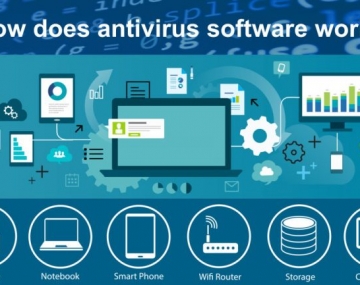Antivirus Software
Originally developed to detect and subsequently remove nasty viruses that could compromise your computer’s operating system, antivirus software was, and continues to be, highly useful and ever-evolving. While most software protects the user from browser hijackers, rootkits, trojan horses, adware, spyware and worms, more advanced software will block malicious URLs, phishing attacks, social engineering techniques and botnet DDoS attacks among others.
The first known computer virus dates to 1949. Known colloquially as the “creeper virus,” the virus infected companies that were running at the time a very remedial operating system called TENEX. The creeper virus was later eliminated by a gentleman known as the “Reaper” who wrote what many consider the first antivirus software ever written. Similar viruses followed and in 1981 a biggie – “Elk Cloner” – hit the public at large via Apple II computers.
Prior to the internet, viruses were spread via infected floppy disks. Virus checkers had to check files coupled with the boot sectors of floppy and hard disks. As soon as the internet became more widespread, viruses exploded exponentially. Flushot Plus by Ross Greenberg and Anti4us by Erwin Lanting were the two preeminent antivirus programs launched in 1987 to fight malicious mobile code. In 1990 the Computer Antivirus Research Organization was formed which ended up providing membership to some of the brightest tech minds at the time.
Once the cloud came around McAfee Labs embarked on the first cloud-based, anti-malware functionality that would provide on the spot, real-time scanning at any moment. This was a giant hit, but as we can all likely attest to, new viruses are rampant and anti-virus programs do need time to respond. Virus designers will test their new creations on existing, anti-virus applications to make sure they cannot be detected prior to releasing them. The whole relationship is akin to police/criminal. Police react to criminals - they do not actively seek to find a criminal who has yet to do anything.
Some of the drawbacks of antivirus software (nothing is perfect) is it can compromise the computer’s performance. The software takes up operating space and the advanced ones require some serious RAM to run. But like anything “necessary,” antivirus software is just that – necessary.
Bitdefender Antivirus Plus 2019
Available for Windows, Bitdefender standout features are Ransomware protection/remediation, VPN, Safepay and privacy tools. While the annual fee is a tad expensive, Bitdefender loads their antivirus software full of security products that are difficult to find at roughly $25 per year. If you’re OK at the opening price and are looking to super-size the offer, Bitdefender Internet Security 2019 will triple the number of covered devices while offering file encryption, parental advisor, firewall and anti-spam.
At a much more affordable $14.99 per year, Norton is a classic in the antivirus software game and widely considered a supreme malware hunter that will protect your PC on its lonesome, guaranteed. Loaded with tweaks, options and settings for those who are into such things, this is great software if you are a more hands-on, knowledgeable user. Setting up and running custom scans is a snap and while there have been reported problems with browser extensions, patches are available, and the problems seem to be diminishing.
Webroot SecureAnywhere AntiVirus
Lastly, Webroot, a lightweight (regarding space on your computer), lightening quick tool that takes literally seconds to install and barely takes up 2MB of your hard drive. The RAM footprint is nearly undetectable and along with core, standard protection, awesome extras such as real-time anti-phishing, smart behavior monitoring, a firewall and a network connection monitor are all worked in. At $19.99 per month, who’s complaining?


Comments:
Login to leave a reply